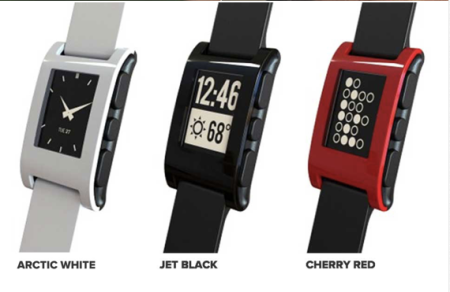Samsung and a crowdfunded company are going to release a new mobile device before Apple. Two years ago, I would have laughed at the notion, but here we are.
The Pebble smartwatch, which raised more than $10 million through a Kickstarter campaign in 2012, was released in Best Buy stores and on Pebble’s website on July 7 at a price of $150.

The second modern smartwatch, Samsung’s Galaxy Gear, will be released in 140 countries on September 25 and in the US and Japan in October. The watch will retail for $300, with bundles available for the Galaxy Gear and Samsung Note 3.
For those unfamiliar, smartwatches are digital wristwatches that connect to smartphones. Wearers can use the watches to take pictures, make and receive calls and send messages through text, Facebook, Twitter and email, as well as operating other apps.
In short, smartwatches work as supplements to smartphones. For a more detailed explanation of their functions, see this rundown of the Galaxy Gear from Gizmodo.
In addition to information about smartwatches, Gizmodo recently published two vastly different opinion pieces on the subject.
Eric Limer said a smartwatch will allow him to see his notifications with greater immediacy and will be convenient in situations where his phone is less accessible. In the comments section of his article, Limer pointed out that because he works on the Internet, he sometimes receives notifications that are urgent, so the quickness of a smartwatch has even greater value.
Jesus Diaz, on the other hand, contended that smartwatches are ugly and lack clear purposes. Further, Diaz criticized technology companies for pushing a product that was never in demand.
“After the commoditization of phones and tablets, companies are desperate to find the next big thing,” Diaz said.
Stuart Dredge of The Guardian technology blog had similar concerns, wondering, “How much of the excitement about smartwatches is due to the desire within the technology industry (yes, including journalists) for a new category-shaking range of devices, rather than actual demand from buyers or a strong sense of why these smartwatches would be useful?”

In any case, Dredge saw some genuine interest in smartwatches, noting that Apple trademarked the name “iWatch” in Japan in June, and Google bought smartwatch company Wimm Labs in 2012.
Apple is of particular interest, as it has been the greatest influence on the mobile market in the last decade, so it seems odd that Apple is being beaten to the punch by Pebble and Samsung.
On a similar note, Wired Business blogger Marcus Wohlsen wrote that Apple’s image as an innovator has become a liability rather than asset. People expect new, breakthrough products from Apple, and when Apple fails to deliver, people are exceptionally disappointed.
Wohlsen mentioned that Apple’s recent unveiling of its new iPhone 5 models, the 5C and 5S, was met with apathy from investors, causing its share price to decrease.
“After the presentation came to a close at the strains of Elvis Costello—no iWatch or new Apple TV in sight—the company’s share price began to trickle lower,” Wohlsen said.
It is possible Apple is coasting on its reputation. I have been an Apple fan for several years, but I’ve been more impressed by what I’ve seen from Android platforms in recent years, while Apple’s upgrades have felt like more of the same.
However, it is also possible that Apple is letting its competitors test a questionable market before it puts time and resources into developing a new product for it.
I don’t want to make a judgment on smartwatches before most of them even come out, but the concept does not strike me as one that will have much appeal beyond the community of technology enthusiasts. Wider audiences may be harder to convince that they need phone companions on their wrists.
While I can see how smartwatches may be helpful (if only marginally) or, at least, fun in a novel way, their functionality is not even close to being worth their price points. For almost the cost of my phone, I want a device to do more than tell me to check my phone.
If most smartphone users are like me, then Apple might have dodged a bullet by being late to the party. Apple’s other innovations fulfilled real wants consumers had. There were markets for high-capacity mp3 players, phones that work like computers and tablets that could replace laptops.
Is there such a market for a tiny computer in a watch?